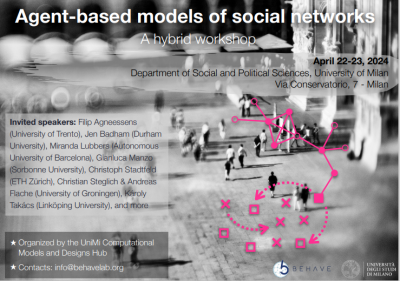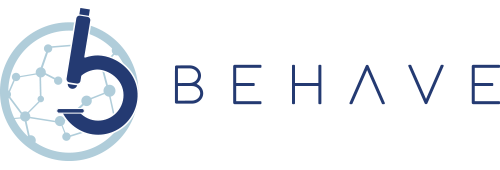Hybrid workshop on “Agent-based models of social networks”, Department of Social & Political Sciences, Seminar room, Via Conservatorio 7, 20122 Milan, 22-23 April 2024
 Organised by the Computational Models and Designs Hub, and funded by the Department of Social & Political Science of the University of Milan under the “Departments of Excellence” MIUR grant, this hybrid workshop aims to explore new frameworks and tools to integrate agent-based modeling and social network research. It is especially targeted to the youngest generation of computational social scientists, e.g., Master and PhD students, who will be exposed to new research agendas by leading scholars in agent-based and social network studies.
Organised by the Computational Models and Designs Hub, and funded by the Department of Social & Political Science of the University of Milan under the “Departments of Excellence” MIUR grant, this hybrid workshop aims to explore new frameworks and tools to integrate agent-based modeling and social network research. It is especially targeted to the youngest generation of computational social scientists, e.g., Master and PhD students, who will be exposed to new research agendas by leading scholars in agent-based and social network studies.
The line-up of speakers and participants include:
Filip Agneessens (University of Trento, Italy), Jen Badham (Durham University, UK), Michal Bojanowski (Universitat Autònoma de Barcelona, Spain), Federico Bianchi (University of Milan, Italy), Cristina Chueca del Cerro (Durham University, UK), Daniel Cowen (University of Groningen, NL), Andreas Flache (University of Groningen, NL), Yunsub Lee (Universitat Autònoma de Barcelona, Spain), Alla Loseva (University of Groningen, NL), Miranda Lubbers (Universitat Autònoma de Barcelona, Spain), Gianluca Manzo (Sorbonne University, France), Francesco Renzini (University of Milan, Italy), Christoph Stadtfeld (ETH Zurich, Switzerland), Christian Steglich (University of Groningen, NL), Károly Takács (Linkoping University, Sweden), Tanzhe Tang (University of Groningen, NL), Raffaele Vacca (University of Milan, Italy), Jochem Tolsma & Tibor Zingora (University of Groningen, NL).
The workshop is chaired by Flaminio Squazzoni (University of Milan, Italy).
To join the workshop online, please fill in this form by 18 April 2024 here. You will receive the link to join the meeting by email on 19 April 2024.
BEHAVE Rendez-vous
The BEHAVE lab hosts monthly regular group meetings for all lab members, including guests, invited speakers and Ph.D. and Master students. They typically take place on Fridays from 3pM to 5PM at the Department of Social and Political Sciences, Via Conservatorio, Passione building, seminar room (2nd floor), if not otherwise indicated.
The meetings revolve around everything that is relevant to research or training of the group, such as (but not limited to):
-
- Discussion of working papers to be submitted to journals (which should ideally be previously shared)
- Confidential discussion of review reports received on manuscripts submitted to journals, including ideas and suggestions for the response
- Mock presentations of members’ conference talks (or Ph.D. defence)
- Discussion of new (even crazy) ideas and calls for collaboration
- Presentation of research published by non-members relevant to the group (e.g., a recently published article or book)
- Discussing ideas for grant applications
- Advanced training: quick hands-on tutorials on new tools/techniques by group members (e.g., “let me show you how to make the best graphs with ggplot2”).
The goals of these meetings are:
-
- Fostering group cohesion and solidarity
- Stimulate new projects
- Ensuring that every member can be at the frontier of research
- Strengthening the quality of training
To join us or schedule a meeting, contact us at our email address here.
AY 2023/2024 Schedule
Department of Social and Political Sciences, Via Conservatorio, Passione building, seminar room (2nd floor) (if not otherwise indicated).
Schedule (to be updated)
8 November 2023, 3 pm – 5 pm: Nigel Van Herwijnen “An Agent-Based Modelling Approach to Social Cohesion“; Eduardo Coltre Ferraciolli “Agent-based modeling and the sociology of money: a framework for the study of coordination and plurality“.
12 December 2023, 4 pm – 5.30 pm: Pietro Saccomanno “Satirical Meme pages on social media: Jokers or Opinion leaders?“; Marco Venturini “An exploratory analysis of the Bitcoin transaction network“.
22 January 2023, 3 pm – 5 pm: Arturo Bertero “The political belief systems of Italian voters“.
27 February 2023, 3 pm – 5 pm: Gian Luca Pasin “A social tipping intervention to promote the adoption of reusable food packaging solutions“; Pietro Saccomanno “Using memes to engage the younger generations with news and politics, A field experiment conducted on 350.000 Instagram users“.
19 March, 3.00 pm – 5.00 pm: Margherita Criveller “Too embedded to fail? A network study of contracts and betrayal between states and mercenaries in renaissance italy’s warfare market” (seminar room Conservatorio building).
4 April, 11.00 am – 1.00 pm: Francesco Renzini “Network Footprints: A Laboratory Experiment on Brokerage and Information Diffusion” (seminar room Conservatorio building).
20 May, 3.00 pm – 5.00 pm: Kevin Tang (Heinrich Heine University Düsseldorf) “Navigating Human Behavior in Health and Education through the Lens of Natural Language” (seminar room Passione buidling)
AY 2022/2023 Schedule
Department of Social and Political Sciences, Via Conservatorio, Passione building, seminar room (2nd floor) (if not otherwise indicated).
Schedule (to be updated)
14 October 2022, 3 pm – 5 pm: Francesco Renzini, “Cognitive Social Structures, Diversity and Coordination: An Experimental Approach”
18 November 2022, 3 pm – 5 pm: Fabio Torreggiani, “Survey and survey experiments using Shiny (R); Elena De Gioannis, “ORSEE platform: recruitment for laboratory experiment”
21 December 2022, 11 am – 1 pm: Esteban Munoz, “Reputation diffusion in networks: The micro-steps of a (very) complex contagion”
24 January 2023, 3 pm – 5 pm: Massimo Airoldi, “Measuring culture with digital traces: some empirical examples”
28 March 2023, 3 pm – 5 pm: Carlo Debernardi e Francesco Renzin, “Who’s your peer? An ABM exploration of editors’ strategy in reviewer selection”
23 May 2023, 3 pm – 5 pm: Pietro Saccomanno, “Are political Internet memes more informative and more memorable than news articles?”; Marco Venturini, “The magic of the marketplace: An empirically calibrated agent-based model of the cryptocurrency market”
To join us or schedule a meeting, contact us at our email address here.
AY 2021/2022 Schedule
Department of Social and Political Sciences, Via Conservatorio, Passione building, seminar room (2nd floor) (if not otherwise indicated).
Schedule (to be updated)
28 September 2021, 11 am – 1 pm: Elisa Bellotti (University of Manchester, UK): Toward malaria eradication. The importance of social influence in the adoption of mosquito bites preventive measures in Meghalaya, India
12 October 2021, 11 am – 1 pm: Gianluca Pasin: “Institutions and social norms of tax compliance: An experimental analysis of the Italian case”
26 October 2021, 11 am – 1 pm: PhD students’ dissertation project presentations
9 November 2021, 11 am – 1 pm: Shyaam Ramkumar: “Role of inter-firm networks in the adoption and diffusion of eco-innovations to accelerate the circular economy transition” + Francesco Renzini, “Punishment mechanisms in a behavioral network formation game”
9 December 2021, 11 am – 1 pm: Elena De Gioannis, “Gender bias in the classroom: Self and peers’ ability attribution among high-school students in Italy”
21 December 2021, 11 am – 1 pm: Giovanni Abbiati (University of Brescia, Italy)
25 January 2022, 3-5 pm: Marco Cremonini, “The dynamical formation of ephemeral groups on networks and their effects on epidemics spreading”
8 February 2022, 3-5 pm: Elena De Gioannis, “Correlates of school closure during the COVID-19 pandemic. A global comparative analysis”
22 February 2022, 3-5 pm: Francesco Renzini, “Explaining advice exchange networks by status-driven preferences and cognitive overload: an agent-based model”
8 March 2022, 3-5 pm: Raffaele Vacca, “Toward testing the intergenerational contact hypothesis: the prevalence and variation of intergenerational ties among older adults in a Covid-19 epicenter”
26 April 2022, 2.30-4.30 pm: Federico Bianchi, “Complex networks keep you smart: a personal-network study on the effect of social relationships on older adults’ cognitive abilities”
17 May 2022, 3-5 pm: Raffaele Vacca, “Introduction to multi-level analysis with R” – part 1
31 May 2022, 3-5 pm: Raffaele Vacca, “Introduction to multi-level analysis with R” – part 2
14 June 2022, 3-5 pm: Fabio Torreggiani, “Social mechanisms of misinformation perception. A survey experiment on the role of social norms and anti-elitism”
To join us or schedule a meeting, contact us at our email address here.
More workshops planned
Hybrid workshop on “Agent-based models of social networks”, 22-23 April 2024
Hybrid workshop on "Agent-based models of social networks", Department of Social & Political Sciences, Seminar room, Via Conservatorio 7, 20122 Milan, 22-23 April 2024 Organised by the Computational Models and Designs Hub, and funded by [...]
Online Workshop on «Social infrastructure and cognitive abilities in an ageing population», 1 June 2021
Online Workshop on «Social infrastructure and cognitive abilities in an ageing population» 1 June 2021 Programme 9.00 - 9.10 AM | Welcome (Flaminio Squazzoni, University of Milan, Behave Director & Marco Castellani, University of Brescia, [...]
Paul Ormerod will give an SPS-BEHAVE seminar on “Big data, machine learning and measuring economic welfare” on 4th February 2020!
Brilliant economist, entrepreneur and author, Paul Ormerod (Volterra partner and visiting professor at UCL) will give an SPS-BEHAVE seminar on "Big data, machine learning and measuring economic welfare" on 4th February 2020, 12.30-14.30 at the [...]
Simone Gabbriellini will talk on “Network effects on tax compliance: An agent-based model” at a SPS-BEHAVE workshop on 20 May 2019
Dr. Simone Gabbriellini (GECS-University of Brescia & Data Scientist and CEO @ Manent.AI will talk on "Network effects on tax compliance: An agent-based model" at a SPS-BEHAVE workshop on 20 May 2019 at 12.30, Seminar [...]
Andreas Flache will talk on computational research on segregation and polarisation in a NASP International Seminar on 22 March 2019 in Milan
Andreas Flache, member of the advisory board of BEHAVE, one of the most influential quantitative sociologists working on computational and experimenatal models of social behaviour in Europe, will talk on computational research on segregation and [...]
The Behave Opening Workshop on 21 March 2019
Matthew Salganik (Princeton University) and Andreas Flache (University of Groningen) at the Behave Opening Workshop on 21 March 2019 Behavioural sociology requires integration of advanced computational and experimental methods The Behave [...]

